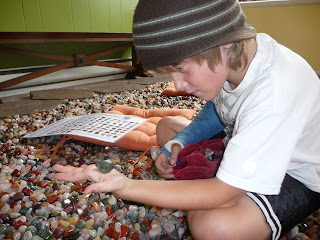
Sorry if this is a repeat for email subscribers, but I just realized this post was hidden in last month's section so I'm reposting for today.
A few weeks ago, I posted the first 28 suggestions from a 1989 book titled 50 Simple Things You Can Do to Save the Earth just to see how far we've come in 20 years. Many of them were slam-dunks (e.g. don't use leaded gas), but a few made me think. Now we're on to the section of the list titled "It Takes Some Effort." Thankfully, many of them really don't take much effort in 2009. I guess that counts as progress.
29. Reuse Old News - This is much easier today than 20 years ago with 8,550 curbside recycling programs in our country and over 50% of all paper products being recycled. Next step: when you need paper goods, look for the recycled content on the label.
30. Recycle Glass - Again, curbside recycling makes this easy, but as the costs of recycling glass increases and the need decreases, this may get more challenging in the future. See my earlier blog,
The Future of Glass Recycling.
31. Don't Can Your Aluminum - Same as above.
32. Precycle - I was impressed this was even a word in 1989. I know I hadn't heard of it till more recently. The key here is to reduce waste before you buy. This is a work-in-progress for me. What about you?
33. Use Cloth Diapers - Thankfully, I'm past this stage, but the great diaper debate rages on. I confess I used disposables. The last I heard, neither disposable or cloth was a good choice (because of all the chemicals required to clean the cloth diapers and fuel used to deliver them to homes). I don't have any babies to try them on, but I've heard
gDiapers is a newer alternative available today that aims for an Earth-friendly and convenient diaper.
34. Put It To Work...At Work - The recommendation here is to be green not just at home, but at work as well. Since I'm blogging about it, I think I'm covered here. This one is much harder for people who work in other industries - the medical industry comes to mind. I remember the days when medical equipment was reused. Now, spend a day in the hospital and you'll be amazed at all the disposable pieces of equipment that get used once and tossed. Seems there should be a middle ground somewhere.
35. Recycle the Rest - plastic, tin, etc. Again, all this is easier now. Ever need to know how to recycle something in particular? Send me an email and I'll see if I can find some answers.
36. Build a Backyard Wildlife Refuge - Well, let's see... I have a 2-year old pug that barks at anything that flies, crawls, or creeps in our backyard so our yard is more of a terror zone than a refuge. My son's second grade class is planning to do something like this in the spring so I'll try to live vicariously through them instead. Just in case you have a backyard that isn't patrolled by a crazy pug, check out the
National Wildlife Federation for tips on attracting wildlife to your yard. You can even become a Certified Wildlife Habitat.
37. Help Protect the Rainforests - I worry about this, but have never done anything to help. I just learned that next week is
World Rainforest Week, so you can count on more information to come.
38. The Great Escape - The recommendation here is that you not let the heat (or air-conditioning) inside your house escape through leaks and cracks. I've never had an energy audit, but it would be interesting to see what they find.
39. Plant a Tree - I've already blogged about chopping down a bunch of trees in my yard, so I probably fail on this one in my own yard, but lately I've been thinking more about urban trees and their impact on the rates of inner-city asthma rates. Another future blog post...
40. Prevent Pests Naturally - I rarely use pesticides in my yard, but I think the bigger issue here is the products I buy that come from farmers who do use pesticides. The local farmer's markets, homegrown vegetables, and organic foods from the store all are a step in the right direction.
41. What a Waste! The recommendation here relates to Hazardous Waste. We all know we shouldn't just dump things like paint and oil, but do we go the extra step to find out how to properly dispose of them? A good first step is to check with your local garbage company or transfer station. Nationally, you can always check with the
EPA. As for me? Looking at my garage, I think I have a tendency to just let the paint cans lie around in the garage. Future project...
42. Carpool to Work - Today's vanpools, transit systems, and carpool lanes definitely encourage this, but I'm afraid Americans still cling to their favorite single-occupant transport system - their car. For me, I get off easy on this one. I work from home so there is no carbon output!
What has this list left you thinking about? I want to learn more about the rainforests, keep working on precycling, and contemplate getting an energy audit in my home. Up next, the last 8 recommendations from 1989.


















